Unit 10 You're supposed to shake hands. Section A Grammar Focus--4c课件 (共14张PPT) 教版九年级全册
文档属性
| 名称 | Unit 10 You're supposed to shake hands. Section A Grammar Focus--4c课件 (共14张PPT) 教版九年级全册 |

|
|
| 格式 | pptx | ||
| 文件大小 | 2.5MB | ||
| 资源类型 | 教案 | ||
| 版本资源 | 人教新目标(Go for it)版 | ||
| 科目 | 英语 | ||
| 更新时间 | 2025-01-05 00:00:00 | ||
图片预览

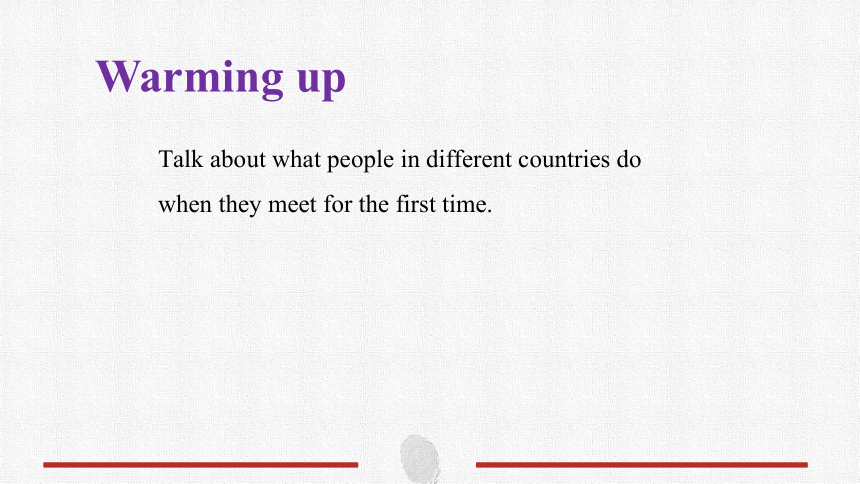
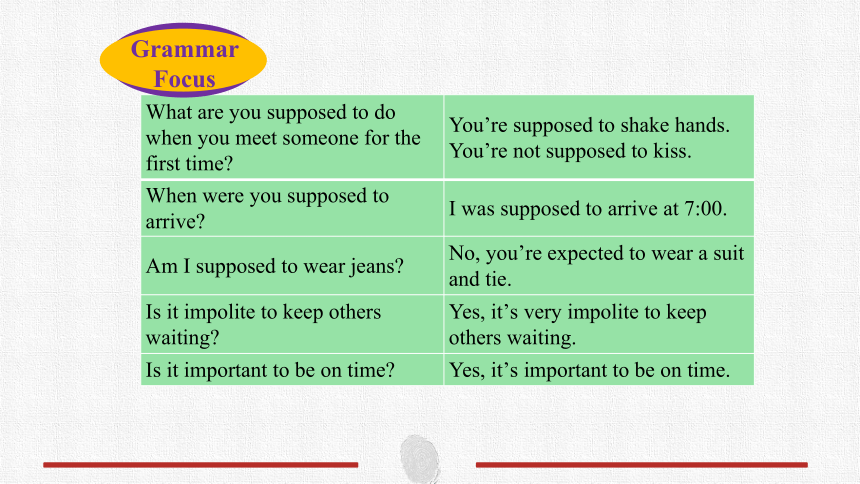

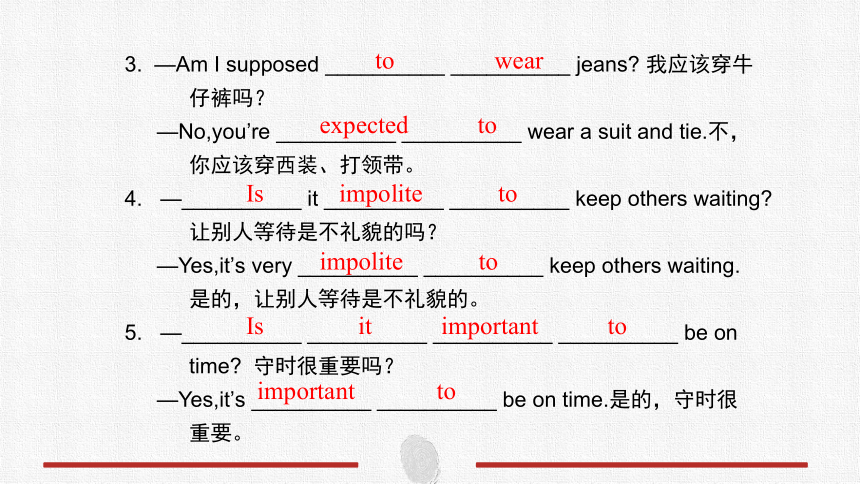
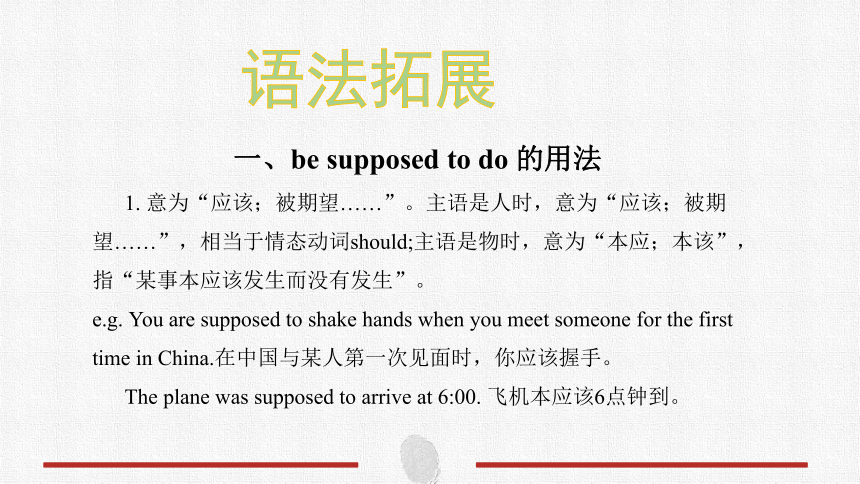
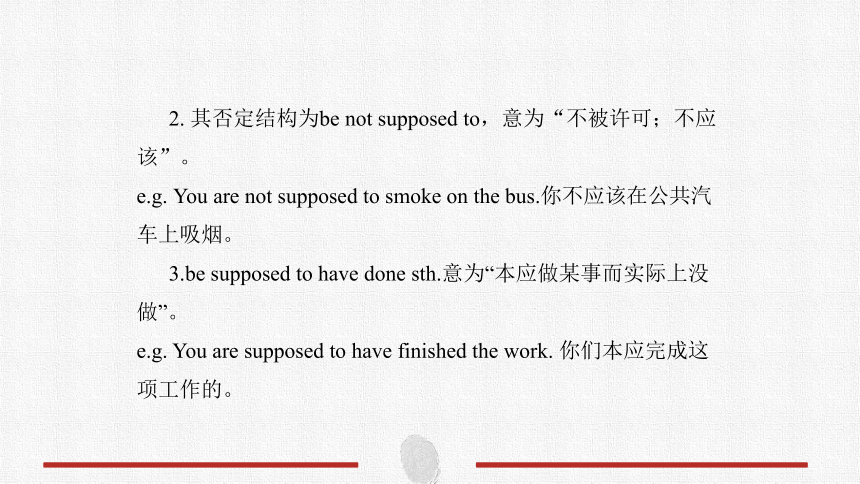
文档简介
(共14张PPT)
Unit 10 You’re supposed to
shake hands.
The Third Period
Section A(Grammar Focus—4c)
Warming up
Talk about what people in different countries do when they meet for the first time.
What are you supposed to do when you meet someone for the first time You’re supposed to shake hands.
You’re not supposed to kiss.
When were you supposed to arrive I was supposed to arrive at 7:00.
Am I supposed to wear jeans No, you’re expected to wear a suit and tie.
Is it impolite to keep others waiting Yes, it’s very impolite to keep others waiting.
Is it important to be on time Yes, it’s important to be on time.
Grammar Focus
Exercise
1. —What __________ you __________ __________ do when you meet someone for the first time 你初次与某人见面时应 该做什么?
—You’re supposed to shake hands.You’re __________ __________ __________ kiss.你应该握手。你不应该亲吻 (对方)。
2. —When were you supposed to arrive 你应该什么时候到达?
—I __________ __________ __________ arrive __________ 7:00.我应该7点到。
are supposed to
not
supposed to
was supposed to at
3. —Am I supposed __________ __________ jeans 我应该穿牛 仔裤吗?
—No,you’re __________ __________ wear a suit and tie.不, 你应该穿西装、打领带。
4. —__________ it __________ __________ keep others waiting 让别人等待是不礼貌的吗?
—Yes,it’s very __________ __________ keep others waiting. 是的,让别人等待是不礼貌的。
5. —__________ __________ __________ __________ be on time 守时很重要吗?
—Yes,it’s __________ __________ be on time.是的,守时很 重要。
to wear
expected to
Is impolite to
impolite to
Is it important to
important to
一、be supposed to do 的用法
1. 意为“应该;被期望……”。主语是人时,意为“应该;被期望……”,相当于情态动词should;主语是物时,意为“本应;本该”,指“某事本应该发生而没有发生”。
e.g. You are supposed to shake hands when you meet someone for the first time in China.在中国与某人第一次见面时,你应该握手。
The plane was supposed to arrive at 6:00. 飞机本应该6点钟到。
语法拓展
2. 其否定结构为be not supposed to,意为“不被许可;不应该”。
e.g. You are not supposed to smoke on the bus.你不应该在公共汽车上吸烟。
3.be supposed to have done sth.意为“本应做某事而实际上没做”。
e.g. You are supposed to have finished the work. 你们本应完成这项工作的。
二、be expected to do 的用法
be expected to do 表示一种可能性,意为“被期许(预期)会做某事”。
e.g. He is expected to do well in the test. 他有望在考试中取得好成绩。
She is expected to arrive at noon. 预期她将会在中午抵达。
三、“It is +adj.+to do sth.” 的用法
意为“做某事是……的”。it 作形式主语,真正的主语是动词不定式。
e.g. It is necessary to learn English well. 学好英语是必须的。
1. When you go abroad, it ______________ bring your
passport.
2. After class, students ________________________ clean
the chalk off the blackboard.
3. If you visit the northern coast of Norway during the winter
season, it ______________ pack warm clothes.
4. If there are people in the meeting room, you ____________
_____________ knock before entering.
5. In many eastern European countries, you _____________
___________ take off your gloves before shaking hands.
be supposed to
be expected to
be important to
is important to
are supposed/expected to
is important to
are supposed/
Complete the sentences with the phrases in the box.
4a
are supposed/
expected to
expected to
Each country has different rules about social situations. A traveler ___________________ (not expect; know) all of these, but it is helpful __________ (learn) as many of these customs as possible. One of the best ways to be accepted in a foreign country is to try ______________(understand) how people think. Learning what you ___________________ (suppose; do) and __________________ (not suppose; do) in social situations may be difficult, but it is worth the trouble if you want to understand another culture.
isn’t expected to know
to learn
to understand
are supposed to do
not supposed to do
Fill in the blanks with the correct forms of the words in brackets.
4b
time what to do for someone’s birthday
meeting people visiting someone’s home
table manners giving gifts
Make a list of advice for someone coming to your country as an exchange student for the first time. Work with your group to give advice about:
4c
e.g.:You’re supposed to arrive on time or a little earlier.
You’re not supposed to eat first when there are older people at the table.
1. go abroad 意为“出国”(教材第76页)
abroad 为副词,意为“在国外;到国外”。
e.g. She often goes abroad on business. 她经常因公出国。
I’ve never lived abroad before. 我以前从未在国外生活过。
2. clean off 意为“把……擦掉”(教材第76页)
clean off 为“动词+副词”型短语,人称代词作宾语时,只能放在两词中间,名词作宾语时,可放在两词中间,也可放在副词之后。
e.g. I wanted to clean off these black marks. = I wanted to clean these black marks off. 我想把这些黑点擦掉。
Language Points
3. In many eastern European countries, you are expected to/are supposed to take off your gloves before shaking hands. 在许多东欧国家,握手前你应该摘下手套。(教材第76页)
take off 此处意为“脱下(衣服)”,为“动词+副词”型短语。当人称代词作宾语时,须置于两词之间;当名词作宾语时,置于两词之间或副词后面都可以。其反义短语为 put on,意为“穿上”。
e.g. Put on your clothes. Don’t take them off. 把衣服穿上,别把它们脱下来。
It’s warm in the room. You can take your coat off / take off your coat. 房间
里很暖和。你可以脱下外套。
【拓展】take off 还可译为“(飞机等)起飞”。
e.g. The plane will take off soon. 飞机马上就要起飞了。
Write a short passage about giving advice when someone is in foreign countries.Use “be supposed to” or “be expected to” to express your sentences. (at least five sentences)
Homework
Unit 10 You’re supposed to
shake hands.
The Third Period
Section A(Grammar Focus—4c)
Warming up
Talk about what people in different countries do when they meet for the first time.
What are you supposed to do when you meet someone for the first time You’re supposed to shake hands.
You’re not supposed to kiss.
When were you supposed to arrive I was supposed to arrive at 7:00.
Am I supposed to wear jeans No, you’re expected to wear a suit and tie.
Is it impolite to keep others waiting Yes, it’s very impolite to keep others waiting.
Is it important to be on time Yes, it’s important to be on time.
Grammar Focus
Exercise
1. —What __________ you __________ __________ do when you meet someone for the first time 你初次与某人见面时应 该做什么?
—You’re supposed to shake hands.You’re __________ __________ __________ kiss.你应该握手。你不应该亲吻 (对方)。
2. —When were you supposed to arrive 你应该什么时候到达?
—I __________ __________ __________ arrive __________ 7:00.我应该7点到。
are supposed to
not
supposed to
was supposed to at
3. —Am I supposed __________ __________ jeans 我应该穿牛 仔裤吗?
—No,you’re __________ __________ wear a suit and tie.不, 你应该穿西装、打领带。
4. —__________ it __________ __________ keep others waiting 让别人等待是不礼貌的吗?
—Yes,it’s very __________ __________ keep others waiting. 是的,让别人等待是不礼貌的。
5. —__________ __________ __________ __________ be on time 守时很重要吗?
—Yes,it’s __________ __________ be on time.是的,守时很 重要。
to wear
expected to
Is impolite to
impolite to
Is it important to
important to
一、be supposed to do 的用法
1. 意为“应该;被期望……”。主语是人时,意为“应该;被期望……”,相当于情态动词should;主语是物时,意为“本应;本该”,指“某事本应该发生而没有发生”。
e.g. You are supposed to shake hands when you meet someone for the first time in China.在中国与某人第一次见面时,你应该握手。
The plane was supposed to arrive at 6:00. 飞机本应该6点钟到。
语法拓展
2. 其否定结构为be not supposed to,意为“不被许可;不应该”。
e.g. You are not supposed to smoke on the bus.你不应该在公共汽车上吸烟。
3.be supposed to have done sth.意为“本应做某事而实际上没做”。
e.g. You are supposed to have finished the work. 你们本应完成这项工作的。
二、be expected to do 的用法
be expected to do 表示一种可能性,意为“被期许(预期)会做某事”。
e.g. He is expected to do well in the test. 他有望在考试中取得好成绩。
She is expected to arrive at noon. 预期她将会在中午抵达。
三、“It is +adj.+to do sth.” 的用法
意为“做某事是……的”。it 作形式主语,真正的主语是动词不定式。
e.g. It is necessary to learn English well. 学好英语是必须的。
1. When you go abroad, it ______________ bring your
passport.
2. After class, students ________________________ clean
the chalk off the blackboard.
3. If you visit the northern coast of Norway during the winter
season, it ______________ pack warm clothes.
4. If there are people in the meeting room, you ____________
_____________ knock before entering.
5. In many eastern European countries, you _____________
___________ take off your gloves before shaking hands.
be supposed to
be expected to
be important to
is important to
are supposed/expected to
is important to
are supposed/
Complete the sentences with the phrases in the box.
4a
are supposed/
expected to
expected to
Each country has different rules about social situations. A traveler ___________________ (not expect; know) all of these, but it is helpful __________ (learn) as many of these customs as possible. One of the best ways to be accepted in a foreign country is to try ______________(understand) how people think. Learning what you ___________________ (suppose; do) and __________________ (not suppose; do) in social situations may be difficult, but it is worth the trouble if you want to understand another culture.
isn’t expected to know
to learn
to understand
are supposed to do
not supposed to do
Fill in the blanks with the correct forms of the words in brackets.
4b
time what to do for someone’s birthday
meeting people visiting someone’s home
table manners giving gifts
Make a list of advice for someone coming to your country as an exchange student for the first time. Work with your group to give advice about:
4c
e.g.:You’re supposed to arrive on time or a little earlier.
You’re not supposed to eat first when there are older people at the table.
1. go abroad 意为“出国”(教材第76页)
abroad 为副词,意为“在国外;到国外”。
e.g. She often goes abroad on business. 她经常因公出国。
I’ve never lived abroad before. 我以前从未在国外生活过。
2. clean off 意为“把……擦掉”(教材第76页)
clean off 为“动词+副词”型短语,人称代词作宾语时,只能放在两词中间,名词作宾语时,可放在两词中间,也可放在副词之后。
e.g. I wanted to clean off these black marks. = I wanted to clean these black marks off. 我想把这些黑点擦掉。
Language Points
3. In many eastern European countries, you are expected to/are supposed to take off your gloves before shaking hands. 在许多东欧国家,握手前你应该摘下手套。(教材第76页)
take off 此处意为“脱下(衣服)”,为“动词+副词”型短语。当人称代词作宾语时,须置于两词之间;当名词作宾语时,置于两词之间或副词后面都可以。其反义短语为 put on,意为“穿上”。
e.g. Put on your clothes. Don’t take them off. 把衣服穿上,别把它们脱下来。
It’s warm in the room. You can take your coat off / take off your coat. 房间
里很暖和。你可以脱下外套。
【拓展】take off 还可译为“(飞机等)起飞”。
e.g. The plane will take off soon. 飞机马上就要起飞了。
Write a short passage about giving advice when someone is in foreign countries.Use “be supposed to” or “be expected to” to express your sentences. (at least five sentences)
Homework
同课章节目录
- Unit 1 How can we become good learners.
- Section A
- Section B
- Unit 2 I think that mooncakes are delicious!
- Section A
- Section B
- Unit 3 Could you please tell me where the restroom
- Section A
- Section B
- Unit 4 I used to be afraid of the dark.
- Section A
- Section B
- Unit 5 What are the shirts made of?
- Section A
- Section B
- Review of Units 1-5
- Unit 6 When was it invented?
- Section A
- Section B
- Unit 7 Teenagers should be allowed to choose their
- Section A
- Section B
- Unit 8 It must belong to Carla.
- Section A
- Section B
- Unit 9 I like music that I can dance to.
- Section A
- Section B
- Unit 10 You're supposed to shake hands.
- Section A
- Section B
- Review of Units 6-10
- Unit 11 Sad movies make me cry.
- Section A
- Section B
- Unit 12 Life is full of the unexpected
- Section A
- Section B
- Unit 13 We're trying to save the earth!
- Section A
- Section B
- Unit 14 I remember meeting all of you in Grade 7.
- Section A
- Section B
- Review of Units 11-14
